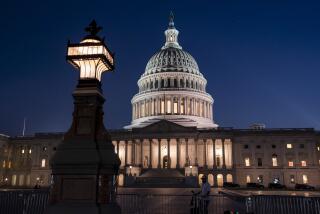Bank Overhaul Bill Narrowly Passes House
- Share via
WASHINGTON — After 20 years of failed efforts, the House on Wednesday passed by the thinnest of margins legislation to lift Depression-era barriers separating banking, securities and insurance.
But the Clinton administration said it would veto the bill in its current form, and the chance of any comprehensive banking measure being passed by both houses of Congress is considered virtually nil this year.
That’s because Sen. Alfonse M. D’Amato (R-N.Y.), chairman of the Senate Banking Committee, has said his panel would not consider the measure unless it won approval in the House by a large margin that showed bipartisan support.
The 214-213 tally came after a nail-biting few minutes in which several lawmakers switched their votes and the total seesawed between approval and rejection.
Republican leaders who had thrown their prestige behind the bill only to have an embarrassing retreat forced on them six weeks ago were exulting after the vote.
Rep. John A. Boehner of Ohio called it “the most significant reform of our nation’s financial services laws in over 60 years.”
The far-reaching measure has been bitterly opposed by consumer activists, most of the banking industry and the Clinton administration, which contends it would favor big bank holding companies at the expense of small banks.
The complex legislation spurred a barrage of lobbying by the financial industry in recent months and divided top federal regulators, the industry and each of the political parties. The banking industry on one side and the securities and insurance industries on the other have been pouring millions into the campaign coffers of key lawmakers.
Consumers Union said the package is a mixed blessing for consumers. While it requires banks to tell customers when financial products aren’t federally insured or when they involve potential risk, it “falls short” of providing full consumer protection, said Mary Griffin, an attorney with the group.
But proponents held out the promise of a globally competitive U.S. financial industry, with consumers benefiting from one-stop “supermarkets” catering to all their financial needs.
More to Read
Sign up for Essential California
The most important California stories and recommendations in your inbox every morning.
You may occasionally receive promotional content from the Los Angeles Times.













